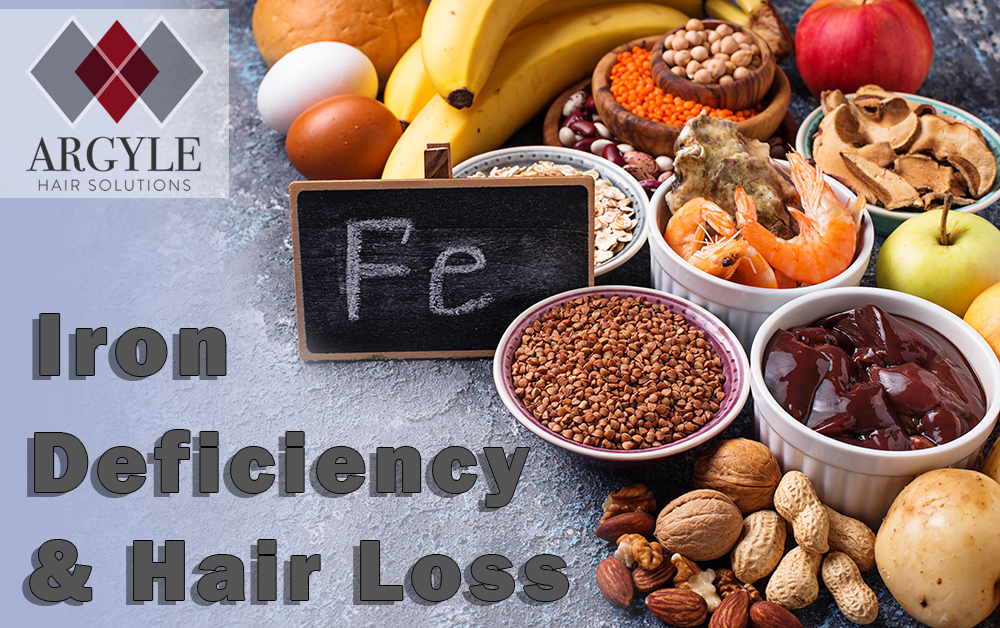
Iron Deficiency and Hair Loss
Iron Deficiency
Iron deficiency is the most common mineral deficiency worldwide and the one most frequently linked to hair loss. Unlike other vitamin and nutrient deficiencies that are only common in countries with substandard dietary intake, iron deficiency is a problem that affects people from all social and economic classes. Let’s get into the how and why.
Why is iron so important?
Iron is an essential element for blood production. Around 70% of your body’s iron is found in hemoglobin (red blood cells that transport oxygen from the lungs to other tissues like the hair follicle) and myoglobin (muscle cells that accept, store, transport, and release oxygen). Hemoglobin comprises 96% of the dry weight of red blood cells, and iron is a core component of its function.
Function of vital organs will be prioritized over hair and nail production when the body is deciding how to distribute nutrients that are too low to meet all needs. When iron is low enough to affect the production and efficiency of hemoglobin, hair production is one of the first things to suffer.
What causes low iron?
Our bodies cannot produce iron, and thus it must be sourced from the food we eat. If you are in a state of anemia, you are either not getting enough in your diet, or your body is unable to absorb the iron in your food. So, what are some of the more common causes?
- Vegetarianism – The best source of dietary iron is meat, as the heme iron in meat is much more easily absorbed than the nonheme iron found in plants. Thus, vegetarians can be particularly susceptible to anemia if their diets do not include fruits and dark leafy greens with sufficient iron content.
- Blood loss – Any time there is sufficient blood loss, iron deficiency can become a problem. Surgery, injury, frequent blood donation, and even heavy menstrual bleeding can cause iron deficiency anemia. Also, slow internal blood loss such as a peptic ulcer, hiatal hernia, or gastral intestinal bleeding.
- Pregnancy – Boosted iron levels are needed to serve the increased blood volume of the mother and also produce hemoglobin for the growing fetus
- Inability to absorb iron – This is something most people overlook. Iron makes its way into the bloodstream via the small intestine. The inability of your gut to absorb iron can be caused by a wide range of conditions.
- Intestinal disorders like celiac
- Having part of the intestine removed surgically
- Bariatric surgery
- Medications that cause a deficiency in vitamins needed for iron processing or suppress acid needed in the gut for absorption.
- Medical conditions that impact nutrient absorption
How do I know if I have low iron?
I could catalog a lengthy list of symptoms (hair loss, brittle nails, headache, rapid heartbeat, fatigue, etc), however, the only real way to know if you are suffering from low iron is to have a blood test.
Testing should include an Iron Panel (also known as Fe Blood Test, Iron Indices Blood Test, or Iron Status Blood Test) – A full iron panel should include several different measurements.
- Ferritin – This is the primary protein used for iron storage in the body.
- Transferrin – This is the protein that binds and transports iron in blood serum.
- Serum Iron Test – This will measure the actual amount of iron in the blood. More specifically, the dissolved levels of Fe2+ in blood plasma.
- Total Iron Binding Capacity (TIBC) – This is the capacity of the blood to transport iron throughout the body.
- Unsaturated Iron-Binding Capacity (UIBC) – Tests the percentage of transferrin that is not attached to iron
- Transferrin Saturation – Tests the percentage of transferrin that is attached to iron
What does this all mean?
These tests will help your doctor determine the root of your iron deficiency. For example, low ferritin and transferrin saturation but elevated serum transferrin could indicate low iron stores and the need to include more iron rich foods in your diet.
Sometimes increasing the amount of iron in your diet is enough to fix the problem. Other times you will need to address and ancillary health concern or nutrient deficiency before your body will have the tools to begin absorbing and using iron again.
Working with your doctor to interpret test results will help you understand what steps need to be taken to correct a deficiency.
Can I have too much iron?
YES!!! And it can be a BIG problem. Excess iron in the body can have more immediate and harmful effects than iron anemia.
To be fair, iron absorption in the gut is tightly regulated by the hormone hepcidin and, absent a failure of this mechanism, iron toxicity from regular food is unlikely.
Iron toxicity is most likely to occur from an overconsumption of iron supplements. For this reason, supplementation should only be done under the care of a doctor.
Conclusion
- Dietary iron is an essential mineral for overall health and particularly important to healthy hair.
- Iron levels can be impacted by a wide range of conditions. A blood test followed up by medical consultation should be done to address concerns.
- Supplementation should only be done under the care of a physician.
